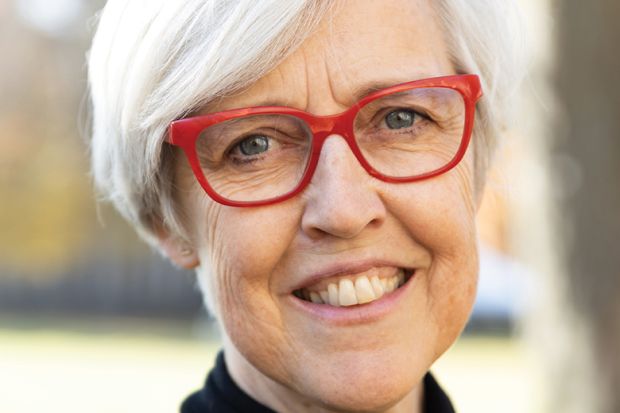Marjoleine Kars is professor of history at the University of Maryland, Baltimore County. Her book Blood on the River: A Chronicle of Mutiny and Freedom on the Wild Coast was named in December winner of the Cundill History Prize, the world’s largest award for non-fiction in English. Professor Kars studied a previously untapped Dutch archive to reveal the hidden history of a 1763 slave rebellion in Berbice, a Dutch colony in present-day Guyana. The rebels took over the colony for a year before the colonists fought back – and executed about 125 of the rebel leaders.
When and where were you born?
I was born in the Netherlands in 1959, where I grew up in two different small towns until I graduated high school and left for the US to attend university, initially just for a year.
How has this shaped you?
The Dutch are open-minded, interested in the world beyond our borders and reasonably adventuresome. I think I got some of those traits. It also made me an avid biker. And perhaps growing up in small towns made me attentive to the complex relationships among people in tight communities.
How did you uncover the archive on the Berbice rebellion?
More or less by happenstance. This book really came about because of the records – the records found me, not the other way around. The book is based on 900 testimonies of people re-enslaved after the rebellion was finally suppressed, which took over a year. These testimonies had not really been used before, and as soon as I read them, I realised they would allow me to write a book about a slave rebellion from the inside out, so to speak, rather than from the top down.
How did you feel when you first uncovered the records?
I felt astonished, super-excited and very lucky. Most slave rebellions were suppressed in the blink of an eye, and for most there are few records from the enslaved themselves. It made me realise that I could write a compelling story that would carry people along while teaching them about slavery and people’s struggles against it.
Why had the history of this rebellion been forgotten, or suppressed?
That is a complicated question. People in Guyana had no access to records kept in the Netherlands in a language they did not understand. That is a common colonial story. Dutch historians in earlier centuries did not see the value of slave testimony, so they relied only on records that provided a colonial point of view. In the 20th century, Dutch historians have been more interested in the East Indies than in the West Indies. English-speaking historians have, until recently, not learned Dutch, so they could not access the records either. All that is beginning to change. Scholars around the world are realising the richness of Dutch archives, and digitisation of records is democratising access.
You travelled to Guyana as part of your research. What did you learn about life there in the past, and today?
The past is very much alive in Guyana. The landscape still bears traces of the colonial period even as people have dismantled the old houses to use them as building materials. Places are still known by the names of former plantations. Shards of pottery dating to the colonial period poke out of the earth after a hard rain. People move about the Berbice River in dugout canoes, as they did several hundred years ago. And people have a great interest in their history.
You’ve given Zoom lectures on your research to people in Guyana. What kind of people were you connecting with, and what did they want to know about your research?
Most of my Zoom lectures in Guyana have been attended by a general audience. People wanted most of all to know more about the records: why are they in the Netherlands, what exactly is in them, should the Dutch translate them into English, and so on. People are very curious, too, about their own family histories – which are very difficult to trace in the records because enslaved people did not have last names. And there were quite a few questions about the relationships between enslaved and native peoples. I was able to connect them with the National Archives in The Hague, which are going to translate a selection of these records into English to be shared in Guyana.
What audience were you trying to reach with the book?
First of all, the people in Guyana, who are not familiar with the Dutch records about their own history. I also wanted to contribute to Dutch debates about slavery and colonialism. So many Dutch people are still rather poorly informed about the foundational role of slavery in the Dutch Republic. And overall, I thought the story of the Berbice rebellion would be compelling to any person interested in slavery and the long, ongoing fight for justice.
What do you think is driving the growing scholarly focus on the legacies of slavery and colonialism?
An awareness that the legacies of slavery and colonialism, namely racism and inequality, ultimately damage all of us. Descendants of enslaved people are increasingly forcing us all to think about how we have glorified our colonial pasts and insufficiently reckoned with what slavery has meant to our shared past.
Is there a book that changed the way you think about the world?
There are so many! Natalie Zemon Davis’ The Return of Martin Guerre showed me the power of micro-history, of history in a grain of sand. Christopher Hill’s The World Turned Upside Down, about the radical ideas of the English poor in the 17th century, really helped me to see what happens when you take seriously the intellectual world of people at the bottom of society.
When are you happiest?
One thing that makes me happy is to hear from readers that my book touched them, proved useful in understanding their own history, or helped them see our shared past in a new way.
john.morgan@timeshighereducation.com
CV
1982: BA, Duke University
1994: PhD, in early American history, Duke University
1994 to present: assistant professor, associate professor and then professor, University of Maryland, Baltimore County
2020 to present: senior editor, International Labor and Working Class History
Key publications include: 2002, Breaking Loose Together: The Regulator Rebellion in Pre-Revolutionary North Carolina (Chapel Hill: The University of North Carolina Press); 2020: Blood on the River: A Chronicle of Mutiny and Freedom on the Wild Coast (New York: The New Press; London: Profile Books, 2022); 2023 (expected): Cambridge History of the American Revolution (three volumes), co-edited with Michael McDonnell and Andrew Schocket (Cambridge University Press)
Appointments
Elizabeth Magill has been nominated as the next president of the University of Pennsylvania. Currently provost of the University of Virginia and a former dean of law at Stanford University, Professor Magill is set to succeed Amy Gutmann at Penn in July. Scott Bok, chair of Penn’s board of trustees, hailed Professor Magill as “an extraordinarily accomplished academic leader” who has “held senior leadership positions at two of the most highly regarded academic institutions in the country”.
Joanne Wright is joining the University of Sydney as deputy vice-chancellor (education). She will take on the role in June after stepping down from her current role as deputy vice-chancellor (academic) at the University of Queensland. She has previously held senior posts at the universities of Sussex and South Australia. Sydney vice-chancellor Mark Scott said that he was “incredibly impressed with Professor Wright’s passion for enhancing the position of teaching and learning and the student experience as well as her commitment to equity”.
Jonathan Van-Tam is returning to the University of Nottingham as pro vice-chancellor for the Faculty of Medicine and Health Sciences. A professor of health protection at Nottingham, he has been on secondment as England’s deputy chief medical officer for health protection since 2017.
Soumitra Dutta will be the next dean of the University of Oxford’s Saïd Business School, from June. He is currently professor of management at the Cornell SC Johnson College of Business at Cornell University.
Paul Johnson has joined the University of Leeds as executive dean of social sciences. He was previously head of the department of sociology at the University of York. Leeds has also appointed Selina Stead, formerly head of the Institute of Aquaculture at the University of Stirling, executive dean of environment; and Jennifer Sewel university secretary. She previously held the same post at Durham University.
Register to continue
Why register?
- Registration is free and only takes a moment
- Once registered, you can read 3 articles a month
- Sign up for our newsletter
Subscribe
Or subscribe for unlimited access to:
- Unlimited access to news, views, insights & reviews
- Digital editions
- Digital access to THE’s university and college rankings analysis
Already registered or a current subscriber? Login








